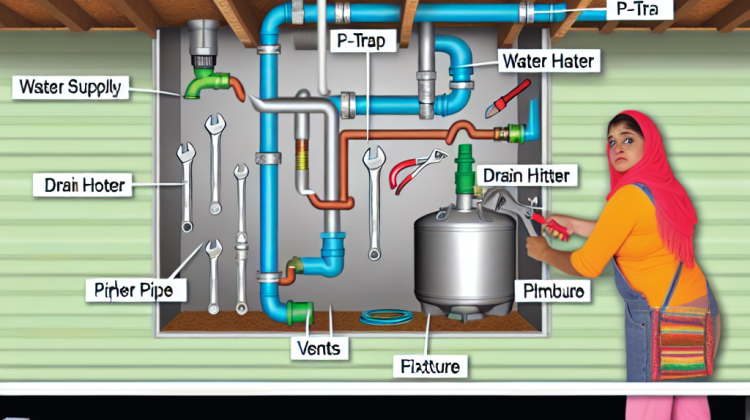
Did you know that over 20 million people in America live in mobile homes? That’s a lot of folks! Mobile homes are cozy abodes that can often be moved from place to place. But just like any other house, they’ve got plumbing systems that need a little TLC to keep things flowing smoothly.
Mobile home plumbing has its own unique history. Back in the day, when mobile homes first hit the market in the 1950s, they were mostly simple metal trailers. But as time passed, they turned into homes with all the regular comforts, including hot showers and running water. The systems for these homes can be a bit different from the plumbing in regular homes. Understanding these special plumbing setups is really important, especially for anyone living in a mobile home today.
So, what makes mobile home plumbing stand out? For starters, it often uses flexible pipes instead of solid ones. This flexibility helps the pipes endure the bumps and shakes that come with being on the move. If a leak happens, it doesn’t necessarily mean you need to call a plumber right away. With some basic tools and a bit of knowledge, many issues can be fixed at home. For example, you can learn to patch up small leaks yourself with just a little tape and patience.
If you’ve ever heard the saying, “A stitch in time saves nine,” it rings true with plumbing! Catching those little problems early can save huge amounts of trouble later on. Did you know that about 10% of homes have leaks that waste at least 90 gallons of water a day? That’s a lot of wasted water! Learning how to spot these leaks, like checking under sinks or looking for damp spots, can help you save water and money.
Another fun fact is that mobile homes usually have their plumbing running through the walls or under the floors. This helps keep the pipes safe from both weather and curious little hands. However, it does mean that checking for problems can be tricky sometimes. Keeping your eyes peeled for any signs of trouble, like odd sounds or changes in water pressure, can make a world of difference.
Fixed mobile home plumbing systems can offer a lot of convenience, but they still need regular care. Like cars need oil changes, pipes need maintenance too! Flushing your drains every few months with some hot water and vinegar can help keep them clear, and using strainers can catch hair and food bits before they cause a clog. Just a little effort can keep the water flowing freely.
Troubleshooting common plumbing issues can also be quite the eye-opener. For example, if you find yourself facing a stubborn clog, it could be as easy as grabbing a plunger. For more serious issues, knowing where the main shut-off valve is can save the day. If a pipe breaks, shutting off the water quickly is key to preventing more damage.
Lastly, keeping your plumbing system winter-ready is super important if you live in a chilly area. Insulating pipes and letting faucets drip during freezing weather can help prevent those pipes from bursting. No one wants a plumbing disaster during the holidays! It’s all about being proactive and staying ahead of any potential problems.
Understanding Mobile Home Plumbing
Mobile home plumbing might seem tricky, but it’s really not that bad. Many folks think it’s just like regular house plumbing, and in some ways, it is! You’ve got water lines, drains, and fixtures all working together. But there are some key differences to know about.
What’s Different in Mobile Home Plumbing
First off, mobile homes typically use PVC or PEX pipes instead of metal pipes. These pipes are lighter and often less expensive, making them easier to work with. However, they can also freeze more easily in cold weather, so watch out!
Another thing is that mobile homes usually have plumbing that runs along the ground. This can lead to a few problems if you’re not careful. If there’s a leak or blockage, it might be in a hard-to-reach spot. You might have to crawl under there to fix it!
Basic Tools You’ll Need
Before you dive in, grab a few tools. You’ll need:
- A wrench
- Pipe cutters
- Plunger
- Tape measure
- Bucket
- Pipe sealant
Having these handy will make your job a whole lot easier.
How to Fix Common Problems
Got a leaky faucet? It’s really a piece of cake to fix! First, turn off the water supply under the sink. Then, use the wrench to remove the faucet handle. You might find a worn-out washer or seal inside. Pop in a new one, and you’re good as gold!
If you’re facing clogs, don’t panic. Start with a plunger. You push and pull it up and down over the drain. If that doesn’t do the trick, you may need to use a snake tool to reach deeper clogs. That’ll get things flowing smoothly again!
Checking for Leaks
Leaks can cause a lot of trouble. It’s super important to keep an eye out for them. Check under sinks and around water heaters regularly. If you spot any damp spots, that’s a sign! Fixing leaks right away can save you a heap of money later on.
Maintaining Your Plumbing System
Every now and then, give your plumbing a little TLC. You can do this by winterizing your pipes before the cold weather hits. Just drain all water from your faucets and add antifreeze to the drains. This helps prevent freezing and bursting!
And don’t forget to flush your water heater once a year. This helps get rid of sediment buildup. It keeps your heater working well and saves energy. Talk about a win-win!
What to Do in Emergencies
Sometimes, things can go haywire! If you have a major leak or burst pipe, turn off the main water supply right away. This will stop further water from flooding your home. Once that’s done, call a plumber if you can’t fix it yourself.
It’s a good idea to keep a list of emergency numbers handy. You’ll never know when you might need ‘em!
Quick Stats
Did you know that approximately 10% of all homes have leaks that can waste more than 90 gallons of water a day? That’s a lot of water going down the drain!
“`html
How to Mobile Home Plumbing FAQ
1. What’s the first step in fixing plumbing in a mobile home?
First things first, you wanna find the problem! Check for leaks or clogs. Turn off the water to avoid a big mess while you work.
2. Can I use regular pipes in a mobile home?
Not so fast! Mobile homes need specific pipes made for them. Using regular pipes might not fit right and could cause more issues.
3. How do I winterize my mobile home’s plumbing?
To winterize, drain all your pipes. Pour antifreeze into the sinks and toilets so they don’t freeze and crack!
4. What should I do if my water pressure is low?
If water pressure’s low, check for clogs first. If everything looks good, there might be a problem with the main supply. Give the water company a call!
5. How often should I check my plumbing?
It’s a good idea to check your plumbing at least once a year. This way, you can catch any small issues before they turn into big headaches!
6. Are there special tools I need for plumbing repairs?
Yes! You’ll need a few handy tools like a wrench, plunger, and maybe some Teflon tape. These tools can help you tackle most problems!
7. I see water stains on the ceiling, what does that mean?
Water stains usually mean there’s a leak somewhere. It’s best to find it quick before it causes more damage!
8. What’s the best way to clear a clogged drain?
Try using a plunger first. If that doesn’t work, a drain snake can be really helpful. Just be careful not to damage your pipes!
9. Can I fix plumbing problems myself?
Sure thing! Many plumbing issues are simple enough to fix on your own. Just take your time and follow the instructions carefully!
10. When should I call a professional plumber?
If the problem’s too big or you’re not sure what to do, it’s time to call in the pros. Better safe than sorry!
“`
Conclusion
When it comes to mobile home plumbing, knowing the basics can save you a whole lot of trouble. First off, it’s super important to keep an eye on the pipes. If they’re old or looking a bit worse for wear, it might be time for a little upgrade. And don’t forget about insulation! Keeping those pipes warm during winter can really help prevent nasty leaks. Also, always remember to check your water pressure; too high can lead to big problems. Using the right tools and parts works wonders.
Lastly, don’t hesitate to ask for help if you’re stuck. Whether it’s a friend or a pro, getting advice can save you time and headaches. Just being careful and following these tips can keep your plumbing working smoothly. So next time you think about fixing something, you’ll feel a lot more confident tackling those plumbing projects on your own! Enjoy the peace of mind that comes with knowing your mobile home is all set with solid plumbing.
